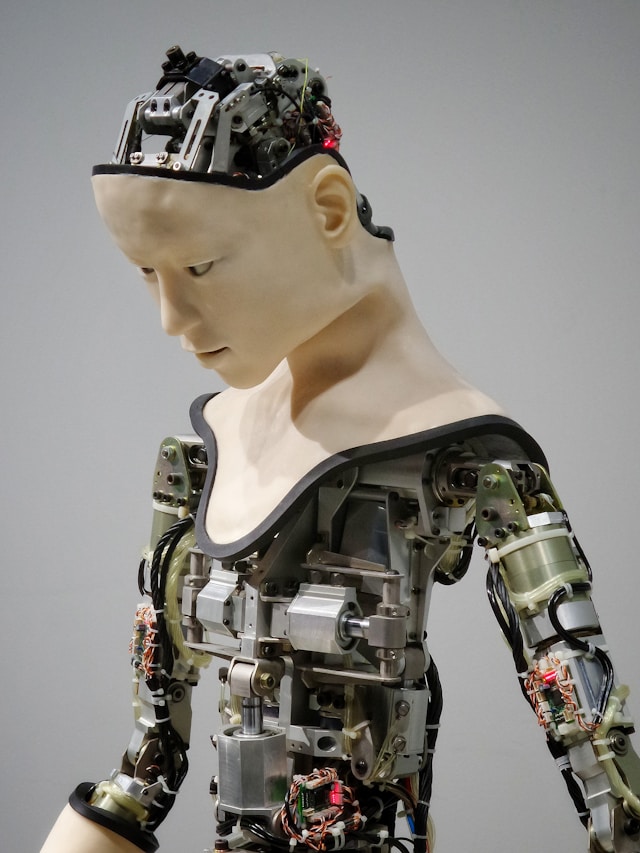
AI is Changing the Game in the Philippines
AI in the Philippines is rapidly reshaping industries, transforming the way businesses operate and compete.
Businesses across sectors are accelerating digital transformation, and AI is at the center of this shift. Adoption is no longer optional—it’s becoming a defining factor for competitiveness.
The AI market in the Philippines is projected to reach $1.02 billion by 2025 and $3.48 billion by 2030, signaling a surge in AI’s role in economic growth. But what do these figures really mean? Are businesses fully prepared to leverage AI’s potential, or is the country at risk of falling behind global and regional competitors?
This article explores the trends, challenges, and opportunities surrounding AI adoption in the Philippines. Beyond the numbers, we break down what these developments mean for business leaders and how companies can position themselves to thrive in an AI-driven future.
The Billion-Dollar AI Boom: Why Businesses Must Pay Attention
The Philippine AI market is experiencing significant growth, driven by increasing demand for automation, efficiency, and data-driven decision-making. While projections indicate a promising future, businesses must assess whether this growth is translating into actual competitive advantages.
AI’s estimated market size was $387.6 million in 2020, growing to $568.04 million in 2023, and is expected to hit $1.02 billion by 2025 and $3.48 billion by 2030. This rapid expansion suggests that AI is no longer just an emerging trend but an essential driver of business transformation. However, while adoption rates are increasing, many companies still struggle with clear implementation roadmaps. Without structured AI adoption frameworks, organizations may invest in AI without realizing its full potential, leading to wasted resources and missed opportunities.
Companies that integrate AI within the next two to three years will likely establish dominant positions in their respective industries, particularly in finance, healthcare, and logistics, where AI-driven efficiencies are already reshaping operations.
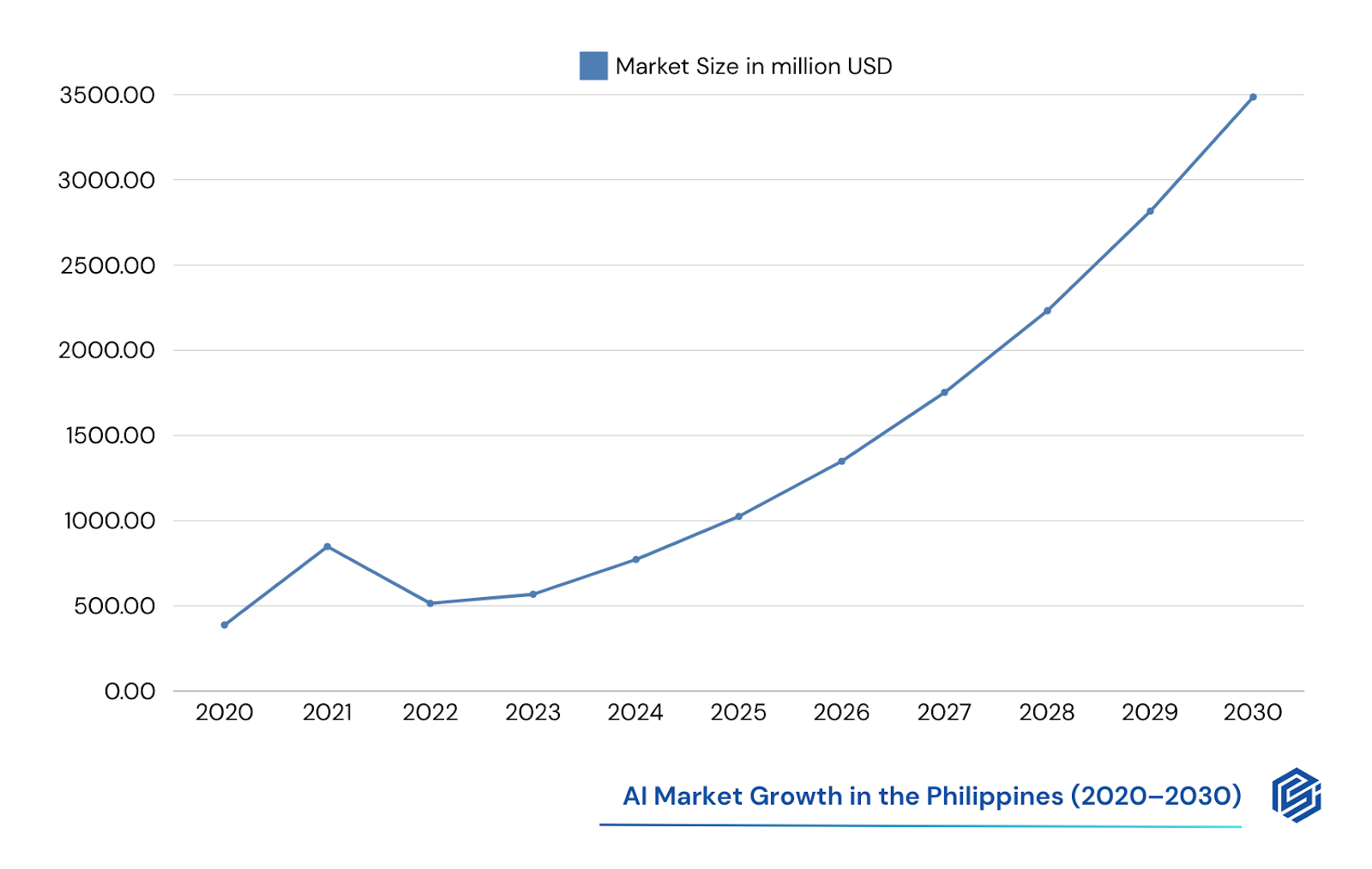
The Philippines’ AI Growth
Compared to AI-driven economies like the U.S., China, and Singapore, the Philippines remains in the early stages of adoption. While AI market growth is promising, the country still lacks the large-scale investments and policies seen in leading AI economies.
The Philippines’ AI market size in 2025 is projected at $1.03 billion, positioning it as one of Southeast Asia’s emerging AI adopters.
While the region is seeing steady AI investment, the Philippines must accelerate its adoption to remain competitive. Compared to Vietnam ($1.00B) and Indonesia ($3.18B), which are aggressively expanding their AI markets, the Philippines has strong government backing but weaker industry adoption.
The Government AI Readiness Score of 74.49 indicates solid policy support, yet the Technology Sector score of only 38.58 highlights a lag in private-sector AI adoption.
Without stronger engagement from businesses, the country risks falling behind regional competitors that are rapidly integrating AI into their economies. Meanwhile, Singapore ($1.40B) remains a leader in AI innovation, investing in infrastructure and research despite a smaller market size. Singapore, with an AI market size of $1.40B, continues to lead in AI readiness, supported by government-backed initiatives and enterprise adoption. On a global scale, the United States’ AI market is projected to reach $66.21B, reinforcing its dominance as an AI powerhouse. While the Philippines won’t compete with the U.S. in scale, businesses must focus on catching up with regional leaders to stay relevant.
While the Philippines is making progress, the gap between it and top AI-driven economies remains vast. Singapore’s AI market is significantly larger, backed by strong government initiatives and business adoption, while the U.S. leads the world in AI investments. To compete, the Philippines must prioritize AI-focused policies, talent development, and infrastructure investment. The next five years will determine whether the country emerges as a true AI innovator or remains largely an AI consumer.
For businesses, this means that early AI adoption is critical. Companies that invest in AI now will have the advantage of setting industry standards, while late adopters may struggle to keep pace in a rapidly evolving market.
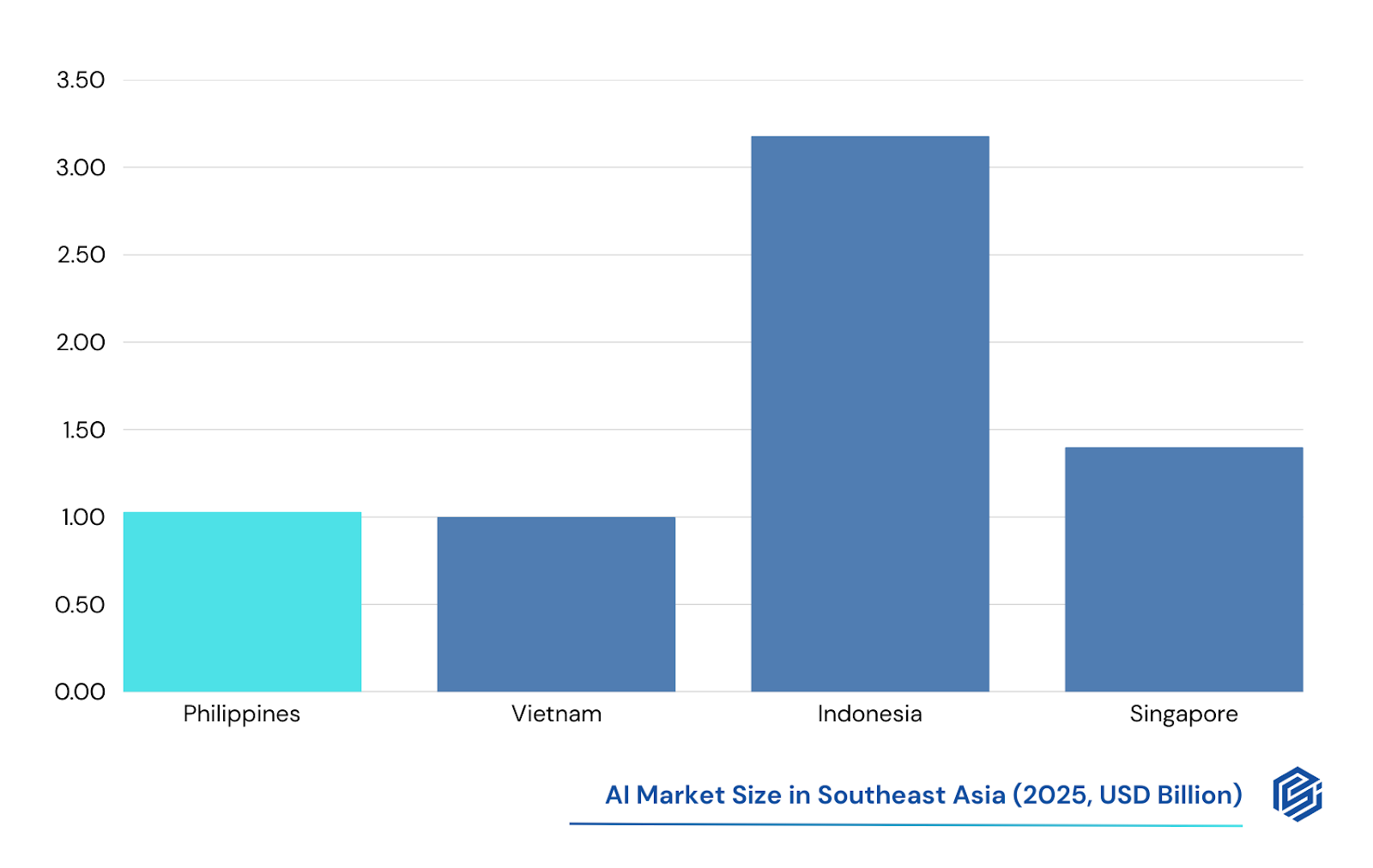
AI Readiness is Rising, But the Philippines Still Trails its Neighbors
While the Philippines’ AI Readiness Score of 58.51 shows commitment to AI development, the country still lags behind regional peers like Vietnam (61.42) and Indonesia (65.85).
The Pacific region, which includes the Philippines, ranks 6th in AI readiness globally, signaling that much work remains to position the country as a true AI leader.
Businesses need to focus on closing the gap by investing in AI talent, infrastructure, and real-world applications. Key indicators include:
- Investment in AI startups: A growing number of AI-driven businesses signals increasing market confidence. Companies should pay attention to emerging AI solutions that could disrupt traditional models.
- Government initiatives: AI policy support will accelerate adoption. Businesses must advocate for AI-friendly policies that encourage ethical and explainable AI.
- Consumer AI adoption: Businesses need to focus not just on AI integration but also on educating customers about AI’s benefits and limitations.
- Impact on labor market: AI will reshape jobs rather than eliminate them. The unemployment rate is projected to decline from 11.18% in 2020 to 7.95% in 2025 and 4.56% in 2030, signaling a shift toward new, AI-enhanced roles.
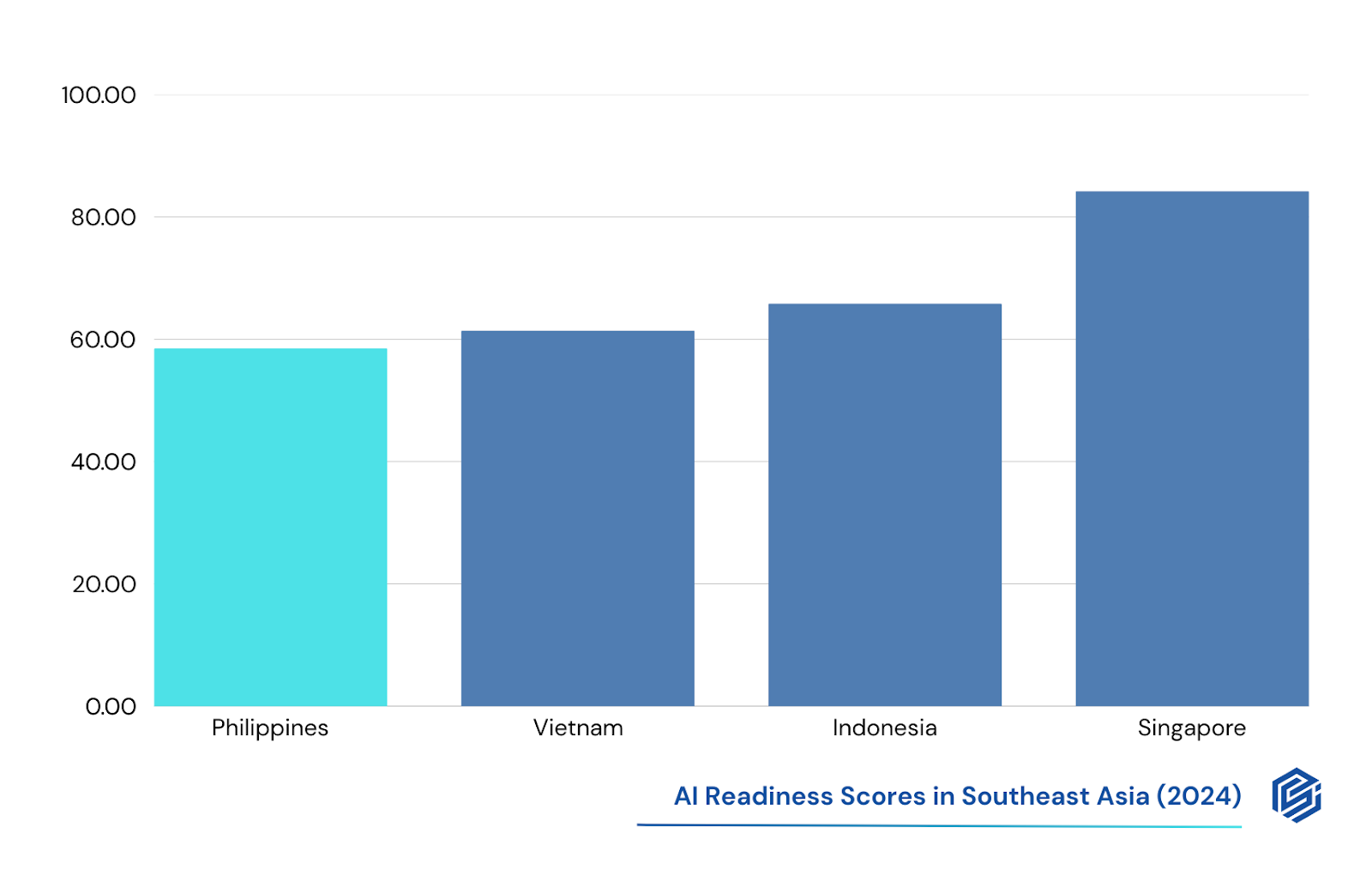
While AI adoption is growing, the real challenge is maximizing its value. Discover how businesses can turn generative AI’s potential into real business outcomes in Turning Generative AI Potential into Business Value — What’s Next?
Making AI Work for Your Business: A Practical Roadmap
Rather than waiting for the “perfect moment” to adopt AI, companies must take proactive steps now. A structured approach ensures meaningful and sustainable AI integration:
- Identify Business Needs – AI should address specific challenges, not just be implemented for innovation’s sake.
- Start Small, Scale Smart – Test AI solutions in focused areas before full deployment.
- Develop AI Talent – Without skilled personnel, AI initiatives will struggle to scale.
- Ensure Ethical and Explainable AI – Transparency in AI decisions builds trust and compliance.
- Measure Impact Continuously – AI success should be tracked, optimized, and adjusted based on real-time performance.
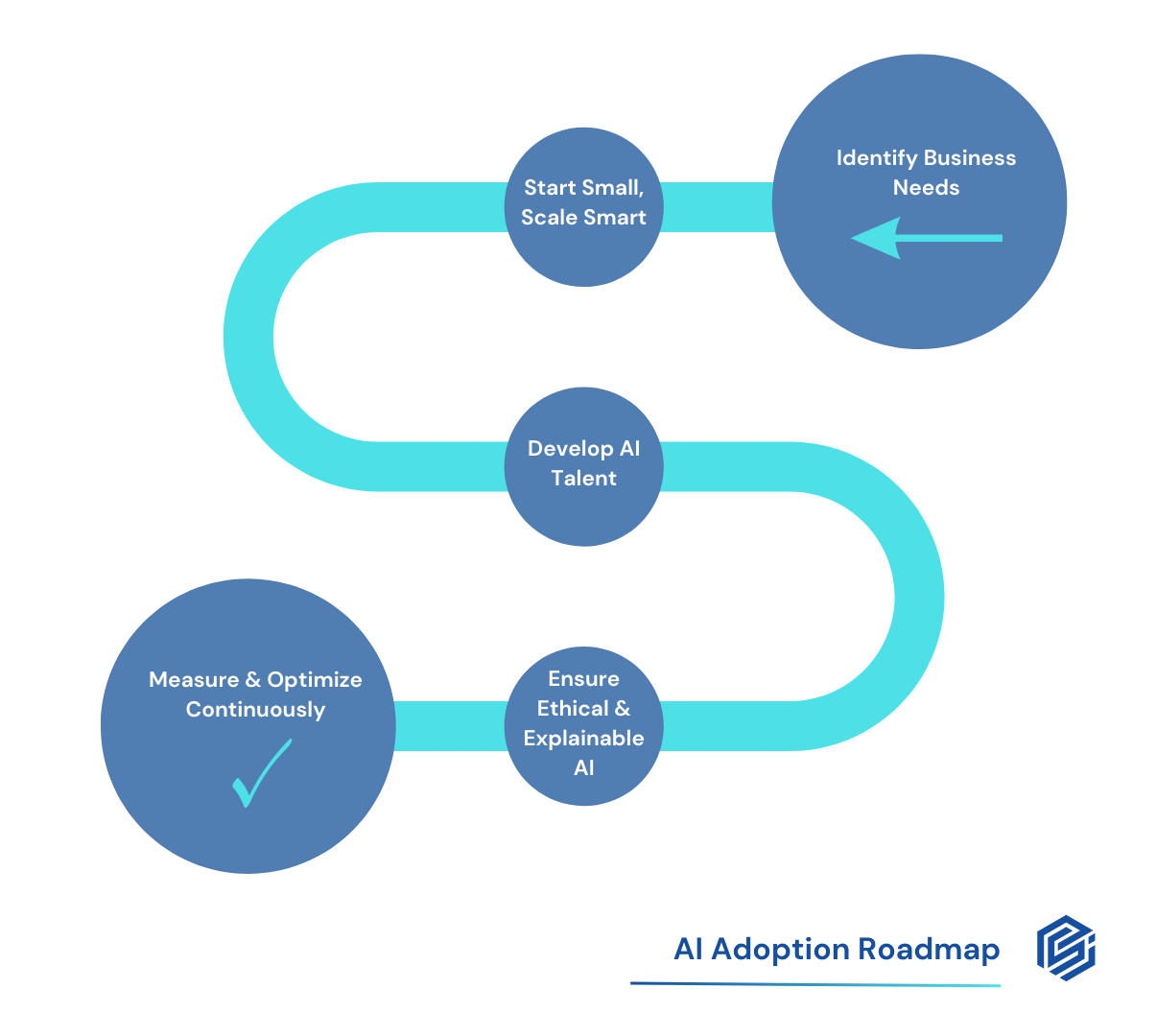
The Road Ahead: Why AI is No Longer Optional for Businesses
AI adoption in the Philippines is accelerating, but its long-term impact will depend on how well businesses strategize their integration. The companies that embrace AI intelligently today will be the ones leading their industries tomorrow. By 2030, AI will be as essential to business operations as the internet and cloud computing are today.
For business leaders, the real challenge isn’t whether AI will be relevant—it’s how quickly they can integrate it to drive competitive advantage.

